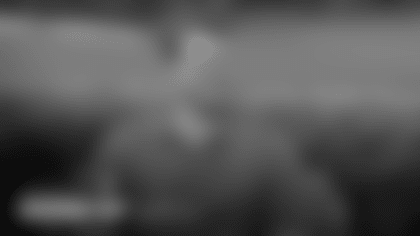Perhaps the biggest indicator of how far Poona Ford has come in the past year was what he didn't do last Thursday night. Ford, who is heading into his second season with the Seahawks, was held out of Seattle's preseason opener along with several other healthy starters who didn't play in the game.
At this time last year, Ford was an undrafted rookie out of Texas who needed every preseason snap he could get to prove he belonged on the team. Now it appears he has already done enough to be considered a starter.
Based off his status as an undrafted free agent, that's a pretty rapid rise for Ford, but it wouldn't come as surprise to those who watched him play in college. Ford started 30 games over four seasons at Texas, and in 2017 was named the Big 12 Defensive Lineman of the Year and was also a first-team All-Big-12 selection.
And in his second camp with the Seahawks, Ford has looked every bit like an all-conference player from a bigtime college program, and not like a player who somehow got passed over by every team in the draft a year and a half ago.
"I think Poona, he has a chance to end up being one of the best nose tackles that could have played," said center Justin Britt. "He's got that God-given leverage and knows how to use it. He knows how to control everything with his size and what not. He's quick. He's great with his hands. I don't know a lot of people that would be better to practice against than Poona Ford to get me ready for Sundays and what not. I'm very appreciative that I get to go against him."
In complimenting Ford, Britt also touched on why the defensive tackle went undrafted in the first place. "God-given leverage" wasn't meant as a knock on Ford—Britt was describing part of what makes him difficult to block—but it could also be taken as a euphemism for being short. In a league where most defensive linemen are well over 6-feet tall, the 5-foot-11, 310-pound Ford stands out. Among his defensive line teammates in Seattle, Ford is the only player under 6-foot-2. And while a lack of height can be a disadvantage—hence him going undrafted—Ford has not just overcome his 5-11 stature, but combined with unusual quickness and long arms, he has learned to turn it into a strength.
"It helps a lot," Ford said of that God-given leverage. "You're already lower than them, so all you need to do is run your feet and lock them out. That helps a lot, and once I put it all together, you'll see how much of a factor it is."
At 6-foot-5, 342 pounds, D.J. Fluker has a considerable size advantage on Ford, but has come to learn that blocking the undersized tackle presents a unique challenge.
"Poona is a challenge, that's a grown man right there," Fluker said. "He's a great dude man, he's real squatty. Playing against him, he's got good quickness, good quickness to be his size, long arms, plays hard to the whistle, and those are the kind of guys that you need on your team and he does a great job of that. Even last year, he showed up."
Knowing Ford might be available after the draft, the Seahawks put their efforts into recruiting him once the 2018 draft came to an end, and the team that has developed a number of undrafted free agents into impact players over the years was able to land another one in Ford.
"He was player of the year in his conference," Carroll said. "Can't do any better than that. It was great that our guys had their sights on him right from the beginning and we recruited him really well and we were able to get him."
After playing sparingly for most of his rookie season, Ford became a bigger part of the rotation late in the year, recording 17 of his 21 tackles over the final five weeks of the season, including four tackles in his only start, Seattle's Week 13 win over San Francisco. Once Shamar Stephen, last year's starting defensive tackle alongside Jarran Reed, left in free agency, it became clear that Ford would be competing for a starting job. Now Ford's quick ascension is even more important for Seattle's defense with Reed facing a six-game suspension to start the season. Ford came into the league known as a run-stopper, and that was also his primary role last year, but he and the team are hoping he can use his quickness and "God-given leverage" to be a pass-rush threat as well.
"That's what it's about, defense is run-first, and I know my role last year was to be a run-stopper, a first and second-down guy," Ford said. "but now I'm looking forward to perhaps having a bigger role this season. It should be a lot of fun."
In Ford, Carroll sees a player who reminds him of former USC standout Jurrell Casey, who became a four-time Pro-Bowler with the Tennessee Titans. And just as Casey and Reed were able to develop into pass-rushers a couple years into their careers—both recorded 10.5 sacks in their third seasons—Carroll hopes Ford will blossom into a pass-rusher, just a year ahead of that schedule.
"We are not counting him out," Carroll said. "If you remember, J-Reed played the run really well for us the first couple years and then really developed. We are hoping to see that kind of progress. We like to see it earlier than three years. We are really after it and hoping he can do something for us."







